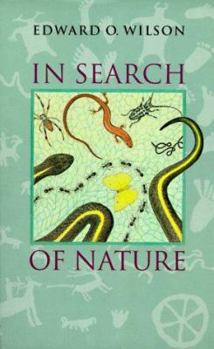In Search of Nature
Select Format
Select Condition 
Book Overview
Perhaps more than any other scientist of our century, Edward O. Wilson has scrutinized animals in their natural settings, tweezing out the dynamics of their social organization, their relationship with their environments, and their behavior, not only for what it tells us about the animals themselves, but for what it can tell us about human nature and our own behavior. He has brought the fascinating and sometimes surprising results of these studies to general readers through a remarkable collection of books, including The Diversity of Life, The Ants, On Human Nature, and Sociobiology. The grace and precision with which he writes of seemingly complex topics has earned him two Pulitzer prizes, and the admiration of scientists and general readers around the world.
In Search of Nature presents for the first time a collection of the seminal short writings of Edward O. Wilson, addressing in brief and eminently readable form the themes that have actively engaged this remarkable intellect throughout his career.
""The central theme of the essays is that wild nature and human nature are closely interwoven. I argue that the only way to make complete sense of either is by examining both closely and together as products of evolution.... Human behavior is seen not just as the product of recorded history, ten thousand years recent, but of deep history, the combined genetic and cultural changes that created humanity over hundreds of thousands of years. We need this longer view, I believe, not only to understand our species, but more firmly to secure its future.
The book is composed of three sections. ""Animal Nature, Human Nature"" ranges from serpents to sharks to sociality in ants. It asks how and why the universal aversion to snakes might have evolved in humans and primates, marvels at the diversity of the world's 350 species of shark and how their adaptive success has affected our conception of the world, and admonishes us to ""be careful of little lives""-to see in the construction of insect social systems ""another grand experiment in evolution for our delectation.
""The Patterns of Nature"" probes at the foundation of sociobiology, asking what is the underlying genetic basis of social behavior, and what that means for the future of the human species. Beginning with altruism and aggression, the two poles of behavior, these essays describe how science, like art, adds new information to the accumulated wisdom, establishing new patterns of explanation and inquiry. In ""The Bird of Paradise: The Hunter and the Poet,"" the analytic and synthetic impulses-exemplified in the sciences and the humanities-are called upon to give full definition to the human prospect.
""Nature's Abundance"" celebrates biodiversity, explaining its fundamental importance to the continued existence of humanity. From ""The Little Things That Run the World""-invertebrate species that make life possible for everyone and everything else-to the emergent belief of many scientists in the human species' possible innate affinity for other living things, known as biophilia, Wilson sets forth clear and compelling reasons why humans should concern themselves with species loss. ""Is Humanity Suicidal?"" compares the environmentalist's view with that of the exemptionalist, who holds that since humankind is transcendent in intelligence and spirit, our species must have been released from the iron laws of ecology that bind all other species. Not without optimism, Wilson concludes that we are smart enough and have time enough to avoid an environmental catastrophe of civilization-threatening dimensions-if we are willing both to redirect our science and technology and to reconsider our self-image as a species.
In Search of Nature is a lively and accessible introduction to the writings of one of the most brilliant scientists of the 20th century. Imaginatively illustrated by noted artist Laura Southworth, it is a book all readers will treasure."






